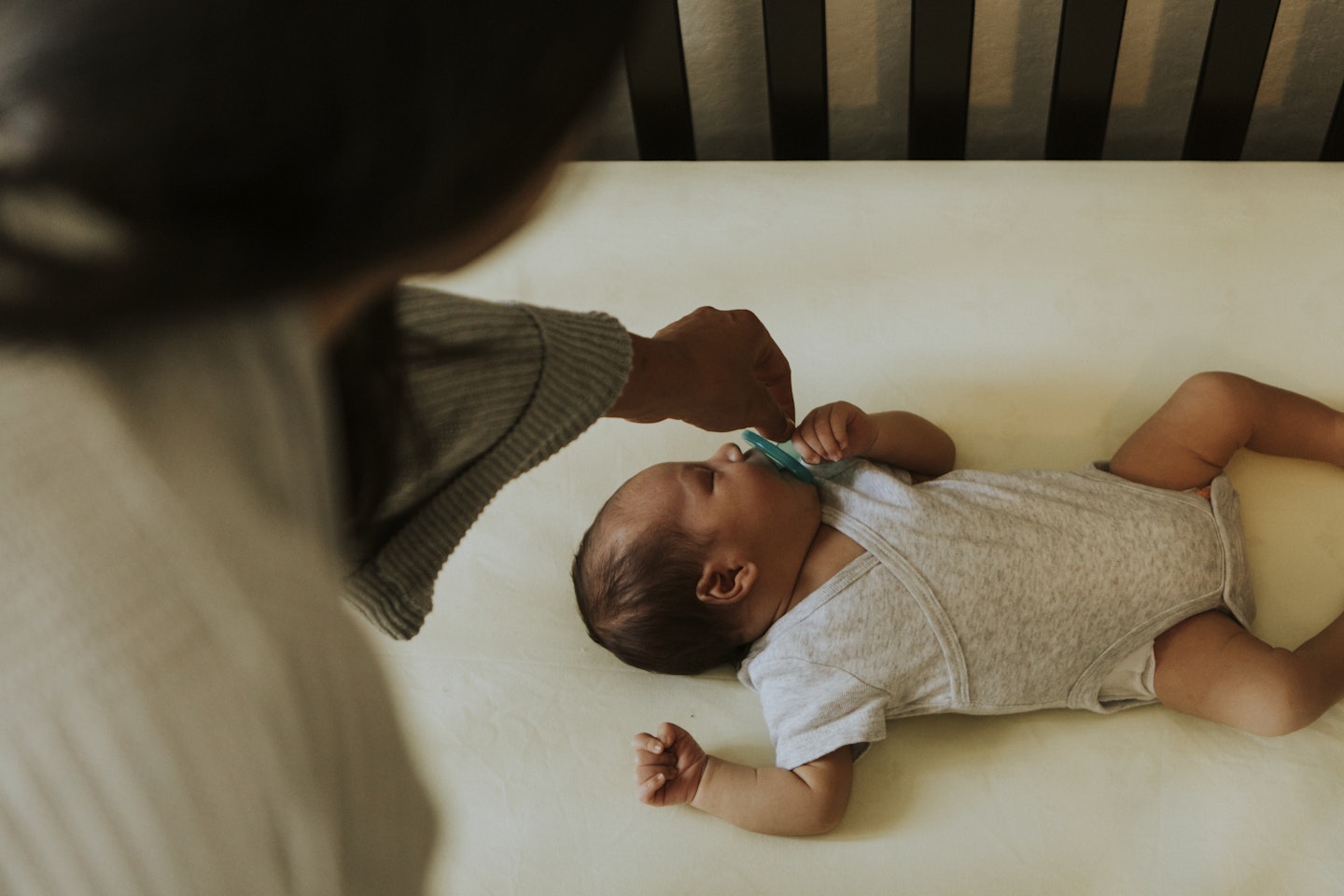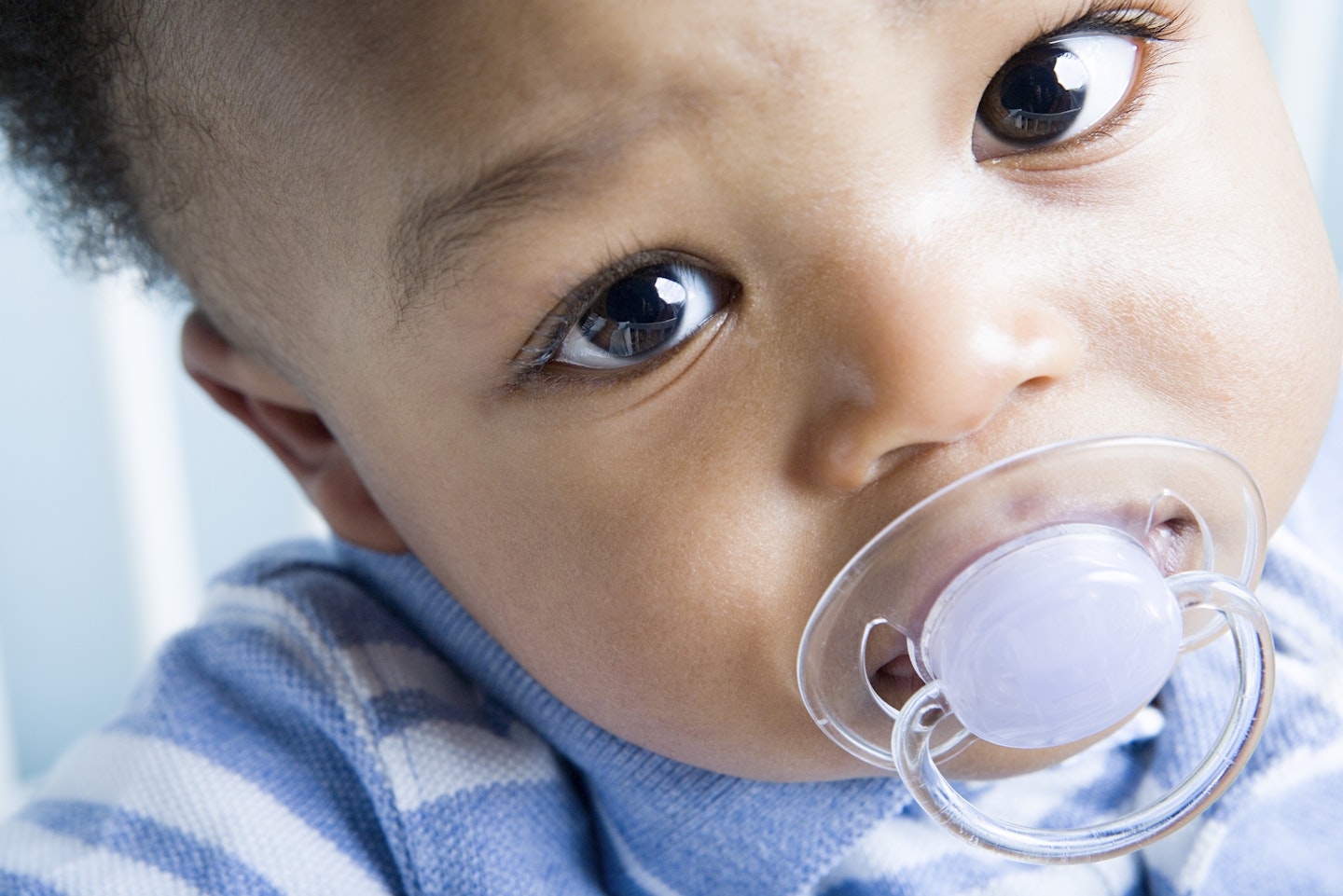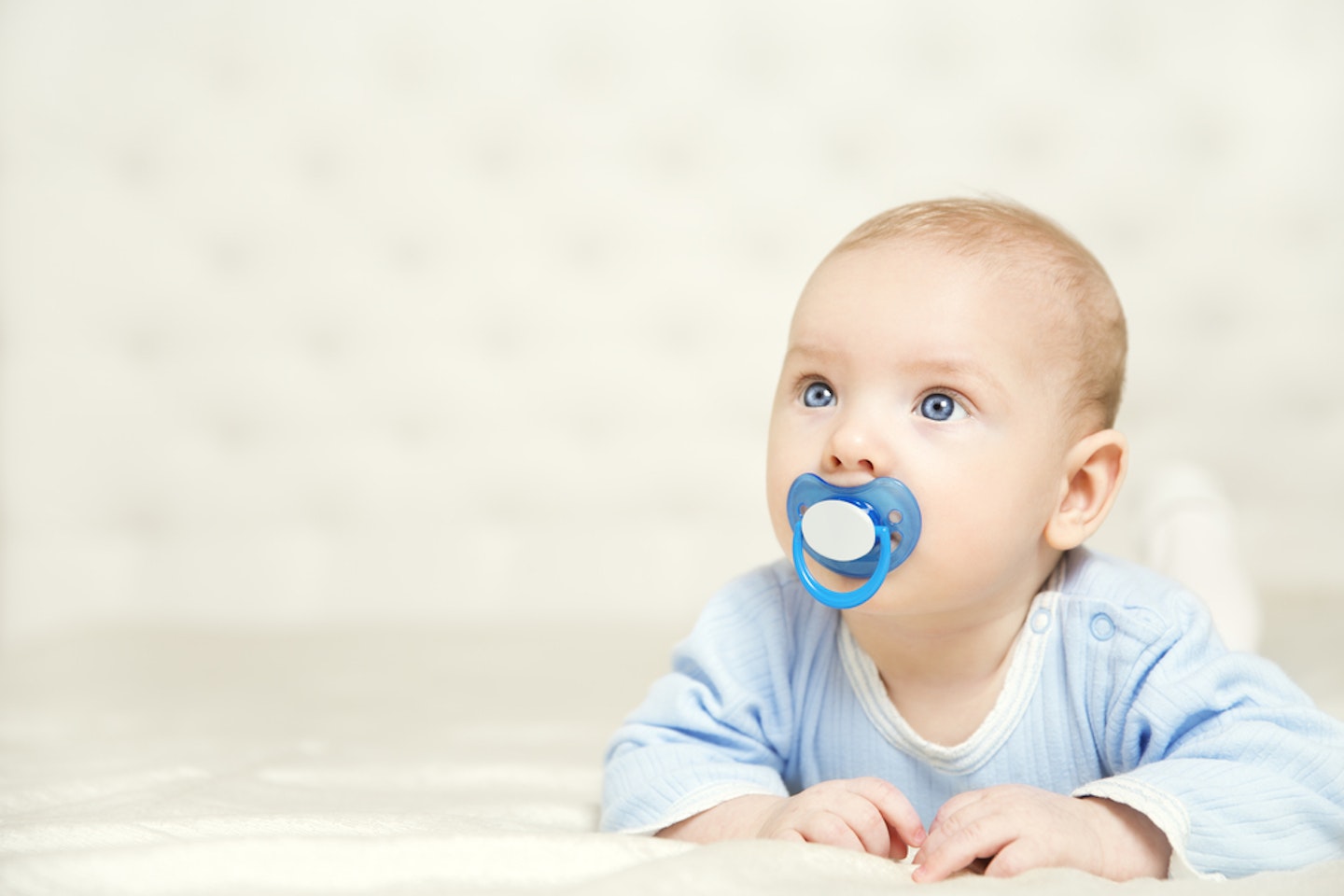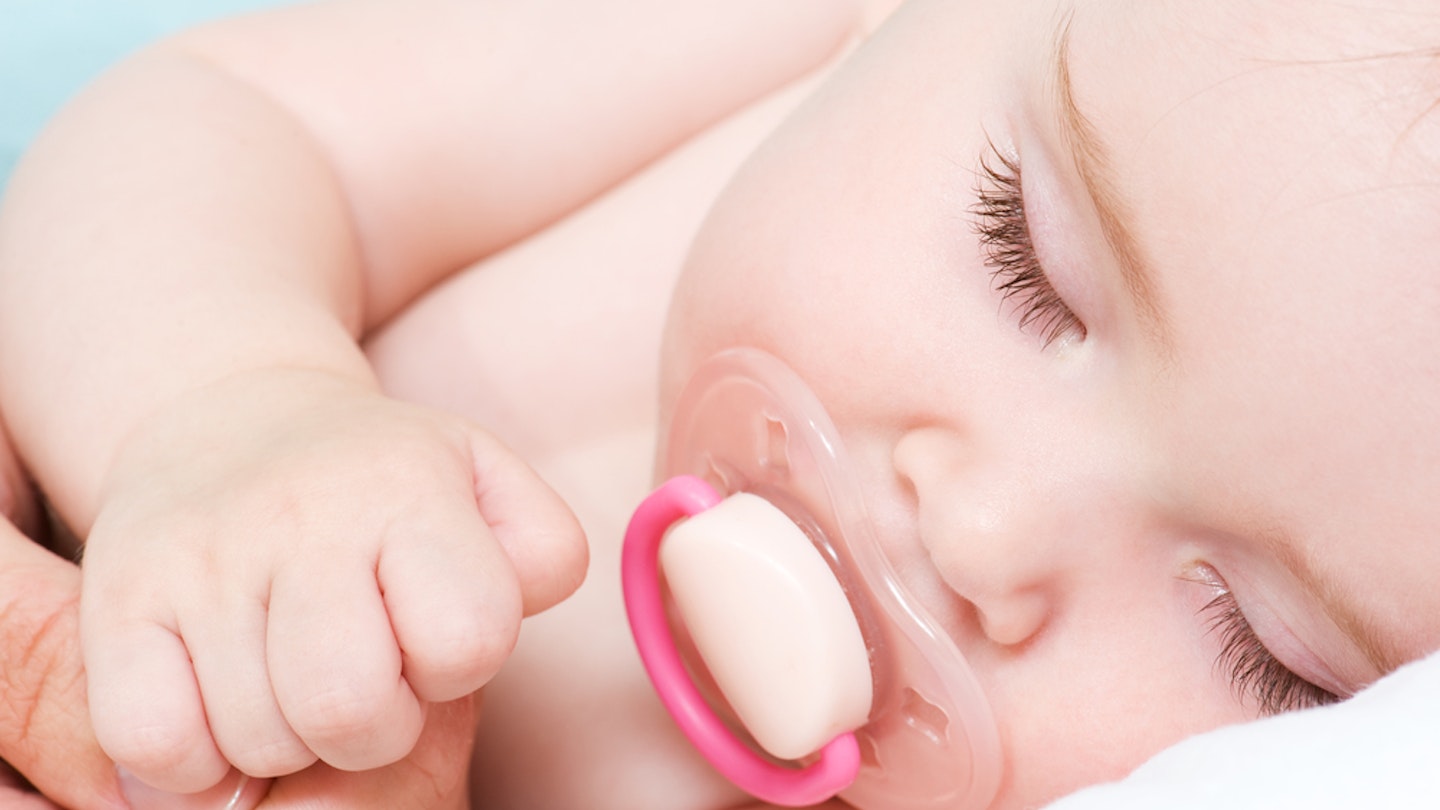Does your tot have a dummy? Perhaps they’re a thumb sucker or prefer to nuzzle on a muslin? If so they're not alone.
In fact, according to theBritish Orthodontic Society, this sucking habit is one of the most common habits during childhood. It can begin by the age of three months, and it's normal for an infant up to the age of two to want to suck.
The modern baby dummy has gone in and out of fashion – the current generation of parents appear to be far more relaxed about their use than their own parents might have been.
But, as with all things, no sooner have we decided that a newborn dummy is just the thing to calm our fretful baby at midnight, some well-meaning friend will assure us that we are setting our little one up for all manner of problems that could impact our baby's development and that we need to whisk it away from our poor, colicky babe!
So, what's the truth about dummies? We find out...
Why do babies want to suck?
Babies are highly evolved to need lots of suckling - it keeps them in our arms safe and secure and out of the way of the dangers of the world. We can’t always suckle our babies as often or for as long as they need and so, for many centuries, mothers have looked for other ways to soothe their fractious babies. The first dummies as we know them appeared around 1900 but other soothers such as sugar-filled cloths were being used as far back as the 1500s.

Is it safe to give a newborn baby a dummy?
Yes! In fact, some special care units use dummies to comfort little and poorly babies whilst they are having tests or injections. Evidence shows that suckling eases pain and when a boob isn’t close at hand, a dummy will do nicely.
If you are breastfeeding your baby then, unless you are separated from them for any reason, it is sensible to hold off from using a dummy until your body has properly worked out how much milk it needs to make, and this won’t be until about the six-week mark. In any case, popping a baby on the boob brings peace so quickly that a dummy simply might not ever be part of your parenting style – they’re an option, not an essential.
If you’rebottle-feeding your baby then you might want to use a dummy if your little one doesn’t thumb-suck as bottles just don’t provide enough sucking time for a young baby.
Are dummies good for a baby?
There is no doubt that sucking is hugely soothing for babies whether it be a boob, a thumb or a dummy and it is also well-evidenced that sucking a dummy at nap and bedtimes is protective against SIDS.
The reason seems to be that sucking a dummy keeps a baby in a similar state of alertness to that of the baby suckling at the breast. If you are a breastfeeding mum then a breast is more protective than a dummy overnight but if your baby is bottle-fed, then a dummy can offer some protection that can’t be gained from the bottle.
Related: How to get your baby to take a dummy
Can babies sleep with a dummy?
Yes, they can. But you should not tie the dummy to the baby with strings or ribbons which could get tangled around your baby.
By the time a baby is a year old, it is sensible to keep the dummy just for naps and bedtimes because, if it is in the mouth during wakeful times as your youngster starts to verbalise, it can make learning to speak tricky – not to mention that you might find it impossible to understand what your little one is trying to tell you!
Dummy safety tips
• Opt for an orthodontic dummy as this will adapt to the shape of your baby’s mouth.
• Do the Pull Test: You should always check your baby's soother before and after handing it over to your child. MAM call this ‘The Pull Test’ where you pull the dummy teat in all directions and discard at the first signs of damage or weakness.
• Throw away dummies that show any sign of wear and tear. This could simply be discolouration or even a rip.
• Never use a neck cord with a dummy.
• Never dip your baby's dummy in sugar or foods of any kind.
What are the pros and cons of using a dummy?
Pros of dummies
Dummies provide comfort and satisfy the deep need for frequent sucklingthat is a normal feature of all human babies. They appear to reduce the risk of sudden infant death syndrome (SIDS), particularly in the bottle-fed baby, and can help reduce pain and distress during painful procedures such as vaccinations.
They can give mum a break from constant rocking and soothing in the difficult evening hours and help a baby adjust to being with another carer for a short while if mum is going out. Finally, a dummy can help a baby to soothe off to sleep after a nice warm bath and a smoochy snuggle, allowing a tired parent to head off downstairs for some grown-up time!

Cons of dummies
Dummies need to be sterilised regularly to prevent infections such as oral thrush from developing in your baby's mouth. They should be replaced every couple of months or sooner if they are damaged in any way at all and so, taking into consideration the sterilising and replacing of old dummies and those that get dropped out of pushchairs, or left at friends’ houses, a dummy habit will prove more expensive than a thumb.
There is some evidence that dummy use can lead to more ear infections although this might be more down to the fact that many dummy-suckers are also bottle-fed, and bottle-feeding is well-known to increase the risk of ear infections.
In the early weeks, dummy use can interfere with the frequency a baby suckles on the breast and this, in turn, can affect milk supply, so it is smart to wait until at least 6 weeks before giving your boob-led baby a dummy.
Finally and most importantly, dummies sometimes become an all-too-easy substitute for rocking, cuddling and snuggling and, despite what your friends and family might tell you, the very best and safest place for a baby to soothe is in arms. Far from creating bad habits, lots of time in arms protects against infections, builds trust and confidence, and is hugely important for bonding. So, if your baby is really crotchety, consider putting down the dummy and picking up the sling.
What are dummy teeth?
Dentists warn that allowing your child to suckle a dummy beyond the age of two can lead to teeth alignment or bone development problems. However, not all children who use a dummy/suck their thumb will develop teeth/bite problems. It depends on how often they suck, how hard they suck and the age they stop the habit. If the child sucks their thumb or a dummy for more than six hours per day or night, this may cause problems with their teeth.
What do dummy teeth look like?
Dummy teeth are an altering of the normal teeth alignment meaning the child's teeth have a visible gap or as teeth grow they don't align up properly. If your child uses a dummy or sucks their thumb you may notice a gap between the front teeth (anterior open bite) – this is common in children with a sucking habit.
Upper front teeth may also stick out slightly and the upper jaw may narrow, causing the back teeth not to meet in the correct position (crossbite).

Will using a dummy irreversibly damage my child's teeth?
No. If your child is under two when they give up their dummy any teeth issues and dental problems that have developed usually correct themselves by about six months after dummy use stops. So, if you start to wean your baby off their dummy at say 12 months they will have no lasting dental issues caused by their dummy.
When is the right time to wean your little one off a dummy?
The NHS recommend phasing out the use of a dummy between six and 12 months but ultimately, you know your child and will be the best person to help them stop using a dummy when the time is right.
If you'd like a bit more health information about dummies, be sure to ask your midwife, health visitor or GP.
Popular articles to read
Mum reveals clever dummy hack to soothe baby's teething pain
